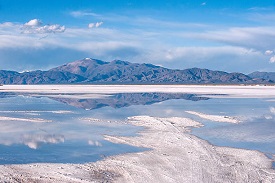Welcome To
FUTURA LITHIUM CORP.
LITHIUM
Here is what you need to know
Lithium is a material that has grown in demand since 2012 when lithium-ion batteries first received credence for larger-sized rechargeable batteries and smartphones started selling in earnest. The overall value of lithium has doubled since 2021 and has no signs of slowing down. The value of lithium at the end of 2021 was $13,400 per ton and by March 2022, it reached $76,700 per ton.
Car manufacturers have experienced pressure to develop electric vehicles, which use lithium as a primary material. Electric vehicles have large rechargeable batteries with a lithium core and the need for lithium mining has increased as the demand for electric vehicles has grown.
Electric vehicle (EV) sales are growing rapidly. Analyst suggest that EVs will represent at least 25 percent of the global fleet by 2030, up from a small percentage of all cars on the road today. By 2050, global demand for lithium is expected to increase by more than 950%.
Electric vehicles have become popular as alternative driving machines and look to be promising investments as prices for oil and gas rise worldwide, making driving an everyday expense that is growing in cost. Another part of the demand is due to the easily sourced and found lithium. Argentina, Chile and Mexico are some of the largest Lithium producers.
Are Lithium price going up??
The price for lithium carbonate has been on an absolute tear as of late. Prices were hovering between $5,000 and $8,000 per tonne in 2020, and they reached as high as $27,000 per tonne in 2021 and $68,000 per tonne in December 2022, according to data from Benchmark for the global weighted average.
The rush for lithium has just started and will last for the next decade and beyond.
The fight against climate change is one of the greatest global challenges of the 21st century, and as paradoxical as it may be, the mining industry, including lithium, will be responsible for providing much of the material needed to make this change possible. The acceleration of the energy transition towards clean energy highlights the need and importance of minerals and metals in the decarbonization and electrification of the economies, and the implementation of more sustainable development models.
The importance of lithium for the energy transition in the region
Lithium is commercialized mainly as carbonate, chloride, or hydroxide, and is used as a raw material for other goods or final products. Its uses are diverse: outside the energy field, its properties are known for various pharmacological and industrial uses, such as the manufacture of glass, ceramics, and aluminum. However, the greatest expectation about lithium is currently generated by its relevance as a critical input for the manufacture of batteries for EVs and energy storage. Lithium-ion batteries are a key element of current technological developments and efforts to electrify the economy. Batteries provide a rapid response, modularization, and flexible installation and will allow for the decarbonization of the transportation sector, and greater integration of intermittent renewable energy technologies into the grid.



